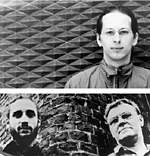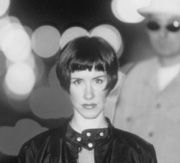MOST POPULAR electronic music comes from DJs like Sasha & Digweed or rock-inclusive groups like Chemical Brothers and the Prodigy for a reason. The prospect of hustling to a club to see electronic musicians recreate their blips and bleeps on stage has about as much appeal as watching strangers do karaoke. The stereotype of a clutch of bespectacled Electronic Musician subscribers gathered around banks of computers, sharpened #2 pencils in hand, seems all too close to reality. Surely, here’s a music style that’s better suited to the bedroom than clubland.
Well, maybe not. The first nationwide tour from two underground electronica mainstays just might open up the playing field. Mike Paradinas—one of the most talented and melodically minded knob-twiddlers going—will headline his first US tour under the name -Ziq (he also records under the monikers Jake Slazenger, Kid Spatula, and Tusken Raiders), aided by an array of purring, whirring synth melodies, thumping rhythms, and synthetic strings. And Luke Vibert, who’s also released spirited chill-out and drum-and-bass albums under the names Wagon Christ and Plug, is touring to support an inventive new album he made with Britain’s pedal steel player to the stars, BJ Cole. By allowing the fresh air of collaboration and inspiration into their sets, -Ziq and Vibert have ushered in a new phase for electronic music performance.
-Ziq, Luke Vibert and BJ Cole
I-Spy, Saturday, February 12
Paradinas might side with the skeptics about electronica’s ability to project from the stage. “I played with Plone and Plaid in Dublin a few weeks ago, but it was all a bit too polite, especially Plone,” Paradinas says of the instrumental duo. To prevent his own performances from being too reserved, Paradinas builds his sets as he goes along, responding to the audience’s every cheer and groan. “I have all my songs at my fingertips—about 40 or 50 tracks,” he explains. “I work out what I’m going to start and finish with, and try to make sure there are peaks in the set. It’s a bit like DJing: If they don’t like it, you end it pretty quick. If they’re liking it, you can make it go on longer.” On this tour’s New York City stop, Paradinas began his set with clinical precision and received polite applause from the sold-out crowd. By show’s end—well over an hour later—the beats had become more kinetic and the cheers and arm-waving from the audience proved they were right behind him on this roller-coaster ride.
Paradinas’ most recent -Ziq album, last year’s Royal Astronomy (Astralwerks), marked a first in his work: vocal harmonies. Paradinas weaves the amorphous words of a singer named Kazumi amongst his usual layers of synthetic strings and bouncing beats. “It gives me an extra sound source,” he notes. “If you listen closely, there are no words, just sounds or syllables. It’s sort of a cross between French and Japanese, but it’s not. She refuses to sing in any language.” The effect is something like hearing poetry in a foreign language, where the overall emotion is palpable even if the specific meaning is not. Live, Kazumi’s vocals—neatly saved onto disc—soar through the mix on the few songs using them, projecting a distinct melancholy that softens the edges of -Ziq’s tracks.
STOP THE PANIC (Astralwerks) probably won’t be the most experimental record you hear this year, but its concept is one of the most original. How did a renowned underground electronic musician hook up with a fiftysomething pedal steel guitar player for a record of swinging beats, loungey kitsch, and hip-hop-tinged pop? “I had this idea about working with a DJ,” recalls the affable Cole, whose lengthy career includes sessions with everyone from Spiritualized and Hanson to Elton John and T. Rex. “I thought there must be a way for a performing musician to interact with people that were working with computers.” Cole tracked down Vibert and the two began trading tracks.
“I did a backing track and I loved what BJ did on top, and it all just grew from there,” says Vibert of Stop the Panic, which evolved over a three-year period.
Not surprisingly, translating such an involved studio project to a stage presented a new set of challenges for the pair. “It’s quite a different sort of animal from the album,” says Cole.
“We couldn’t really copy the album for a start,” Vibert continues. The two perform about half of the album’s 13 tracks on stage and have written another five or so new pieces that grew out of the performances. “Live, they sound really different because most of my stuff on the album came from my computer and sampler, and I don’t take either of those with me on the road. I just take little bits and pieces and we try to resynthesize it, but it’s different every time, which is nice. There aren’t many things set in stone.” At the New York show, as Vibert attended to his equipment, occasionally pausing for long swigs of beer, Cole seemed to respond to each beat as a new challenge, plucks and strums emanating from his instrument and beaming through the house mix like a smile from the gods.
“It’s very liberating. I get plenty of room to improvise over the top within the themes of each piece,” gushes Cole. “I’ve worked with lots of bands, but nothing as imaginative and liberating as this. Because me and Luke have a mutual respect thing going, it becomes quite joyous doing it.”








